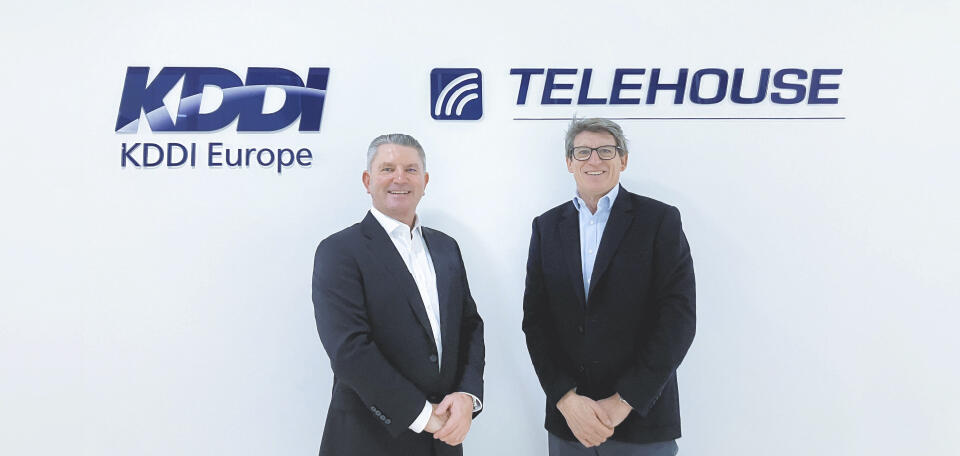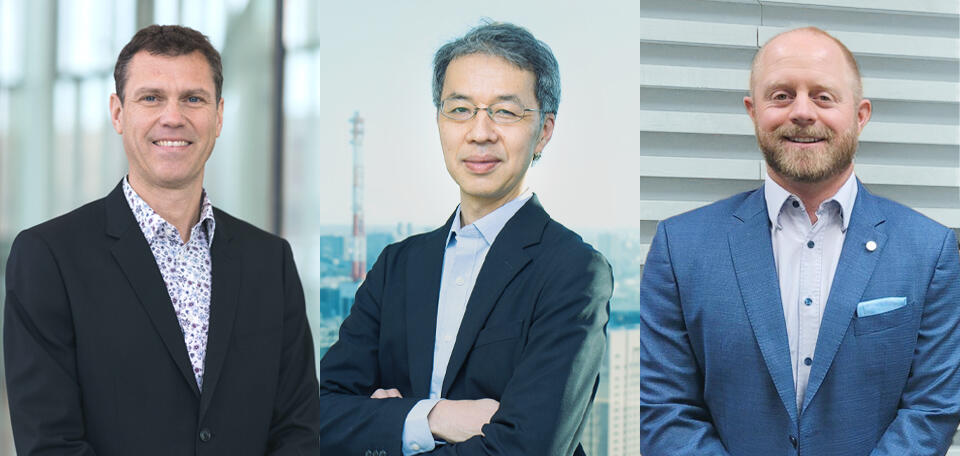- KDDI HOME
 Corporate Information
Corporate Information  Research & Development (R&D)
Research & Development (R&D)  KDDI's 'Global Communication Platform' paves the way for a safer and more comfortable car society of the near future.
KDDI's 'Global Communication Platform' paves the way for a safer and more comfortable car society of the near future.


KDDI's 'Global Communications Platform' connecting 83 countries and regions around the world.
―What is KDDI's Global Communications Platform (hereinafter referred to as "GCP")?
Iwanaga: KDDI's GCP serves as a foundation for providing high-quality and stable communication globally between the in-vehicle communication devices installed in automobiles and the cloud. It is a mechanism for automakers to deploy connected services globally.
―What exactly are the connected services enabled by GCP?
Ribbing: For instance, mechanisms that automatically call the police, hospitals, or emergency services in the event of an accident, and features that allow for remote monitoring and checking of a vehicle's condition are typical examples of connected services. KDDI's role is to support the global deployment of such services through GCP. GCP not only provides high-quality connections between in-vehicle communication devices and the cloud but also offers features such as integrated management dashboards for controlling the communication status of each vehicle.
Cars are becoming more and more "software defined" which means that as long as the car is connected to the network, capabilities can be upgraded remotely over the air (OTA) long after the car has been sold. This enables automotive manufacturers to continuously improve the quality and value of their products over their lifetime, e.g. by introducing new safety features or improve driving experience.
―In connected services, what role does KDDI's GCP play?
Iwanaga: Automotive connected services are essentially provided by automakers, and by providing GCP, KDDI is supporting their efforts on a global scale and co-creating new solutions.
―What are some examples of co-creation?
Iwanaga: Since 2019, KDDI has been providing mobile communication infrastructure for connected services to Toyota Motor Corporation and other major Japanese automakers. Today, we provide this service to 83 countries and regions through GCP.
―You are further expanding the circle of co-creation.
Vaughn: Yes, KDDI has been promoting its connected business, focusing on providing connected services to Japanese automakers. Today, GCP is available in 83 countries and regions. In the future, KDDI will provide GCP's services to automakers outside of Japan and further expand its coverage to other territories.
―Not a few telecommunications operators offer global telecommunications services like GCP's. What are GCP's strengths against the competitors?
Vaughn: Yes, KDDI has a number of competitors in connected business. So, many of our competitors provide global communication services based on 'roaming solutions.' On the other hand, KDDI focuses on partnering with local telecommunications operators in countries where GCP is deployed, to offer the most suitable communication service for each region.
―How does this policy benefit automakers and other customers?
Iwanaga: Simply, it's high communication quality.
Using roaming agreements between telecommunications operators allows for the swift provision of services across many countries. However, this approach can lead to delays in identifying and rectifying issues when problems arise. Consequently, this also extends the recovery time for the connected services provided by automakers.
To deliver the high-quality communication that automakers require, it is crucial to directly partner with local operators. By exchanging information between both companies' departments responsible for line quality, we can improve services and provide the communication quality that customers demand.
In truth, partnering with local telecommunications operators to expand the coverage area of communication services is not an easy task. However, to provide the high-quality communication services that automakers demand over the long term, it is necessary to overcome these challenges.
Connected services that adapt to changing values towards automobiles.
―How do you hope to change the automotive society through the provision of GCPs?
Iwanaga: KDDI has been committed to supporting the connected services offered by automakers in various countries by providing high-quality communication services globally, thereby enhancing the safety and convenience of automobiles. Furthermore, with the advent of 5G technology, there is now a demand for connected services that offer rich entertainment, known as 'Infotainment [1]' services. KDDI plans to continue providing high-quality communication services that contribute to the development and spread of such services. Infotainment is a portmanteau of 'information' and 'entertainment.'
Ribbing: The need for infotainment services in automobiles is a sign that the trend of connected cars is transforming vehicles into 'smartphone-like' devices. This means that cars have become like smartphones, with various functions defined by software that can be added or updated. Therefore, the ability to connect to external networks with high quality, and to comfortably use services such as infotainment, has become an important added value for automobiles.
Furthermore, today's younger generation wants to be connected to the Internet and comfortably use social networking and streaming services while traveling by car. KDDI aims to support the expansion of features and services that meet the needs and changing values of this younger generation towards automobiles, keeping an eye on these evolving preferences.
―Do you have any specific plans for measures to support new connected services such as infotainment services?
Vaughn: To respond to the new trends in connected services, it's crucial not for KDDI alone to shoulder everything but to strengthen relationships with partners. With this philosophy, in 2021, KDDI invested in Station Digital Media Inc., a U.S. company with a rich track record in consulting and developing applications for automobiles and entered a capital and business alliance with them. By enhancing relationships with external partners and leveraging their strengths to the fullest, expanding the connected business is a fundamental policy for KDDI. In the future, there are plans to broaden the base of the connected business to include modes of transportation beyond automobiles.
Creating an Automotive Society that Contributes to Solving Social Issues
―Connected services should help solve social issues. what issues do you want to solve with GCP?
Iwanaga: In Japan, the aging of drivers who have supported the logistics and transportation industry, represented by the '2024 problem' in the logistics and transportation sector, has become a serious issue. Furthermore, in various regions of Japan, there is a decrease in public transportation drivers, and initiatives such as municipalities operating on-demand buses are also seen. Connected services are mechanisms that can contribute to solving such social issues. KDDI and various automakers are united in their efforts to address social issues such as aging and depopulation, which Japan is facing ahead of other countries. We hope that this will eventually contribute to solving social issues in other countries as well.
Ribbing: Connected services are a steppingstone towards the future of autonomous driving in vehicles. The realization of this technology should fundamentally solve social issues such as the aging of drivers and labor shortages. KDDI's 5G technology can significantly contribute to the advancement of autonomous driving. Moreover, it has the potential to optimize or enhance the efficiency of vehicle driving and operation, thereby reducing CO2 emissions.
―KDDI will be exhibiting for the first time at MWC Barcelona 2024, one of the world's largest mobile networking events. What do you most want to present at this event?
Iwanaga: At MWC Barcelona 2024, with 'connectivity' positioned as one of the exhibition areas, we will focus on clearly demonstrating 'The New Possibilities Created by Connectivity in 2030' as envisioned by KDDI. We will propose and promote the world we aim to achieve through connected solutions such as GCP, from both technological and business perspectives. Through this, we hope to increase awareness of KDDI's technological capabilities among a wider audience and foster co-creation with various automakers and partners.
KDDI will continue to evolve its connecting power and expand its connected business globally in partnership with others, while providing high-quality communication services.







